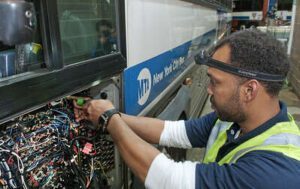5 Disadvantages of Electric Buses Explained
Disadvantages of electric buses are; high initial cost, range and battery limitations, specialized skill and knowledge requirement, battery disposal challenges, and unsustainable power sources.
This article discusses the disadvantages of electric buses, as follows;
1). High Initial Cost (as one of the Disadvantages of Electric Buses)
One of the most prominent disadvantages of electric buses is their purchasing price, which is significantly higher than that of gasoline buses.
Relatively-high cost of electric buses at the point of purchase, can be attributed to energy management, charge transmission and energy storage components.
Batteries are an especially expensive component of electric buses [1], whose cost is dependent on their type, design, and capacity.
Since the three criteria mentioned above determine the vehicle’s performance to a large extent; it could be argued that high capital investment is inevitable when the goal is to obtain electric buses with optimal performance.
The cost of electric buses is a problem because it acts as a hurdle to the adoption of this technology as a sustainable alternative to gasoline buses.
However, it must be mentioned that the cost of electric buses over their entire lifecycle, tends to be lower than that of gasoline buses due to the exclusion of fuel and engine maintenance requirements.
2). Range and Battery Limitations
Electric vehicle battery technology is still in its developmental stage, meaning that the technology is likely to encounter practical limitations in its utilization.
One of such limitations is the charge-and-storage capacity of EV batteries.
For electric buses, the implication of this is a scenario where vehicular performance is limited by battery shortcomings.
Limited battery capacity translates to relatively-short travel range for electric buses.
Given the fact that charging facilities are not widely established in all areas, an instantaneous recharge for drained batteries is not guaranteed. On the other hand, gasoline buses are generally equipped with more consistent and reliable options for power consumption and replenishment, since oil and gas technology is more widely established.
Batteries may also vary in performance under different geographic and climatic circumstances, so that it is not too uncommon for electric buses to perform at lower capacity than they specify [5].
Related challenges in thus category include problems with starting and mobility.
3). Specialized Skill and Knowledge Requirement (as one of the Disadvantages of Electric Buses)
Effective electric bus usage is not possible without the availability of a significant amount of specialized technical skill and knowledge.
Such knowledge includes that required for repair, maintenance and operation of electric buses by technician and drivers.
These requirements can constitute a major hurdle, especially in cases where the established knowledge and skills are those for gasoline vehicles.
Training for the adoption of electric buses is usually accessible, but this implies additional time and fiscal expenditure.

4). Battery Disposal Challenges
The disposal of electric bus batteries at the end of their service life can pose a safety challenge to the ecosystem and its inhabitants, because of the presence of toxic chemical compounds in the compositional make-up of these batteries [4].
While it is possible to subject EV batteries to a recycling process, it is not always guaranteed that this process will be sustainable or lead to a mitigation of environmental impact.
Since the optimization of electric bus performance depends to a large extent on battery capacity (and battery capacity can often be correlated directly to volume and area), management of battery-related waste remains a prominent issue that cannot be overlooked.
Also, the presence of recycling challenges means that electric buses may not be a perfect fit for circular economy, until these challenges are addressed; which in turn is only possible through major innovative improvements in both battery composition and waste management technology.
5). Unsustainable Power Sources (as one of the Disadvantages of Electric Buses)
Although electric bus technology is a sustainable and green concept, there are often issues regarding the source of electricity used to charge the batteries of these buses.
This is especially so because fossil fuel is one of the most-used energy resources in power plants [3].
Charging electric bus batteries with unsustainable electricity is a problem to the environment, economy and society, and is behind several health and environmental issues [2].
Conclusion
Disadvantages of electric buses are;
1. High Initial Cost
2. Range and Battery Limitations
3. Specialized Skill and Knowledge Requirement
4. Battery Disposal Challenges
5. Unsustainable Power Sources
References
1). Caley, J.; Erin, N.; Leslie, E.; Matthew, J. (2020). “Financial Analysis of Battery Electric Transit Buses.” Available at: https://doi.org/10.2172/1659784. (Accessed 26 December 2022).
2). Clairand, J-M.; Gonzalez, M.; Guerra-Terán, P.; Cedeño, I.; Escrivá, G. E. (2020). “The impact of charging electric buses on the power grid.” 2020 IEEE PES General Meeting, Montréal, Canada. Available at: https://doi.org/10.1109/PESGM41954.2020.9282014. (Accessed 25 December 2022).
3). Islam, M.; Mohammad, S.; Adam, S. A.; Zeehan, S. M.; Yee, L. J. M. (2022). “The influence of shifting the electric bus charging routine on the techno-economic performance of a solar-powered bus depot,” Energy, Elsevier, vol. 239(PD). Available at: https://doi.org/10.1016/j.energy.2021.122316. (Accessed 25 December 2022).
4). Muller, P.; Duboc, R.; Malefant, E. (2021). “Recycling electric vehicle batteries: ecological transformation and preserving resources”. Field Actions Science Reports Special Issue 23 | 2021. Available at: http://journals.openedition.org/factsreports/6690. (Accessed 26 December 2022).
5). Nunno, R. (2018). “Fact Sheet | Battery Electric Buses: Benefits Outweigh Costs.” Available at: https://www.eesi.org/papers/view/fact-sheet-electric-buses-benefits-outweigh-costs. (Accessed 25 December 2022).